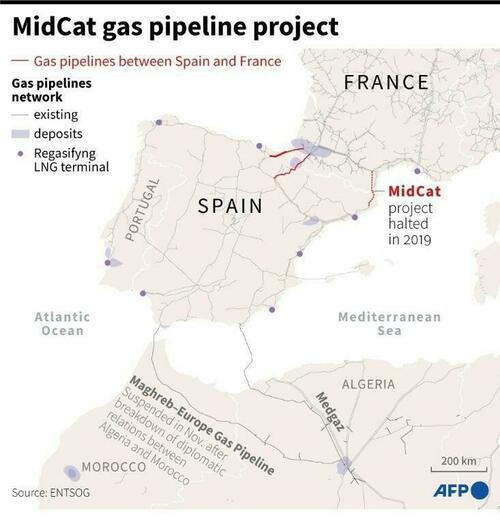
Triggered by Western sanctions against Russia over its invasion of Ukraine, Europe's energy crisis presents an opportunity for Spain and Portugal to significantly elevate their role in energizing Western Europe.
On Friday, Spanish Energy Minister Teresa Ribera said that a new gas link from Spain to France could be ready by April or May of 2023.
"This new interconnection, this gas pipeline, could be operating in about eight or nine months on the southern side of the border, that is, from the Pyrenees to Spain," Ribera told TVE. Pipeline construction would also be required in France to complete the link, and Spain's prime minister has said the EU would have to pay for interconnections.
Ribera's timeline is far more ambitious than one put forth by Spanish gas grid operator Enagas. The firm's CEO recently said the link could be built in two and a half years at a price of 600 to 700 million Euros.
Ribera said such a pipeline has the potential to boost Spain's gas export capacity by 20 to 30%.
"Much of Europe’s LNG import capacity lies on the Iberian peninsula, which is viewed in the industry as a gas “island” as there is limited pipeline capacity connecting it to northern Europe," explains the Financial Times.
Though Spain has several liquefied natural gas (LNG) terminals to receive gas via the sea, the country has only two low-capacity pipeline connections to France. An earlier initiative to add a 120-mile, high-capacity pipeline -- the "MidCat Project" -- fell apart in the face of environmentalists' opposition and the collapse of financial backing.
With Russia throttling its exports and wholesale gas prices nearly 10 times recent levels, Western European leaders are pursuing new energy links with great urgency.
On Thursday, German Chancellor Olaf Scholz called for a new pipeline from Portugal to central Europe via Spain and France. He said a pipeline from the Iberian Peninsula was "conspicuously absent" and that such a pipeline promises to make "a massive contribution" to alleviating the EU's energy woes.
Triggered by Western sanctions against Russia over its invasion of Ukraine, Europe’s energy crisis presents an opportunity for Spain and Portugal to significantly elevate their role in energizing Western Europe.
On Friday, Spanish Energy Minister Teresa Ribera said that a new gas link from Spain to France could be ready by April or May of 2023.
“This new interconnection, this gas pipeline, could be operating in about eight or nine months on the southern side of the border, that is, from the Pyrenees to Spain,” Ribera told TVE. Pipeline construction would also be required in France to complete the link, and Spain’s prime minister has said the EU would have to pay for interconnections.
Ribera’s timeline is far more ambitious than one put forth by Spanish gas grid operator Enagas. The firm’s CEO recently said the link could be built in two and a half years at a price of 600 to 700 million Euros.
Ribera said such a pipeline has the potential to boost Spain’s gas export capacity by 20 to 30%.
“Much of Europe’s LNG import capacity lies on the Iberian peninsula, which is viewed in the industry as a gas “island” as there is limited pipeline capacity connecting it to northern Europe,” explains the Financial Times.
Though Spain has several liquefied natural gas (LNG) terminals to receive gas via the sea, the country has only two low-capacity pipeline connections to France. An earlier initiative to add a 120-mile, high-capacity pipeline — the “MidCat Project” — fell apart in the face of environmentalists’ opposition and the collapse of financial backing.
With Russia throttling its exports and wholesale gas prices nearly 10 times recent levels, Western European leaders are pursuing new energy links with great urgency.
On Thursday, German Chancellor Olaf Scholz called for a new pipeline from Portugal to central Europe via Spain and France. He said a pipeline from the Iberian Peninsula was “conspicuously absent” and that such a pipeline promises to make “a massive contribution” to alleviating the EU’s energy woes.







